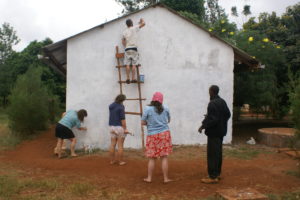When you know better, do better

In the latest in our series of posts by former voluntourists, Catherine Cottam reflects on her experience six years ago volunteering in an orphanage in Kenya, and tells us what drives her today to support families, not orphanages, as a Stahili advocate.
In 2012, I was in graduate school working on my Master’s Degree in School Counseling. An actor I followed on Twitter mentioned that he and his wife would be going to volunteer at an orphanage in Kenya and invited fans to join them through a nonprofit they supported. I didn’t end up going on that trip, but the desire to go to Kenya and volunteer stayed with me. I did some research, discovered a nonprofit that would help facilitate my desire to volunteer for a fee, and started fundraising to purchase items for the children at an orphanage.
In July of 2012, I traveled to a small village in Kenya to volunteer. I spent a week at the orphanage, believing that all of the children were “orphans” in need of care and protection. There were approximately 40 children living at the orphanage, with ages ranging from three to fourteen. As a volunteer, I helped paint a building to prepare it for a mural, helped children with their homework, helped with cleaning, laundry, and food preparation, and provided funds to purchase two goats and several pairs of shoes.
However, it soon became clear that donated items were “disappearing” at the orphanage. With fellow volunteers, I found two locked rooms full of usable donated items that the children did not have access to, in spite of their obvious need for the clothes, shoes, and other items. I didn’t know at the time that the children and their families were being exploited for the personal gain of the man who ran the orphanage. I would later find out that almost all of the children had at least one close family member, some of them even having living parents. Their family members had been told they would be better off and well taken care of at the orphanage. Instead, the children were recruited in order to attract fee-paying volunteers and exploited in order to attract donations.
At the time, I was unfamiliar with the term “voluntourism”. I genuinely thought I was doing my part to help make the world a better place. What did I do for those kids while I was there that had any lasting impact? I shared photos of myself and the kids on Facebook and was proud of myself for “making a difference”, when in truth, I did nothing that would in any tangible way change the lives of the children I met. While the children and the experience had an impact on my life, I had done more harm than good. The children should never have been there to entertain volunteers. Instead, they should have been at at home with their families and focused on their studies.
I remember the precise moment when I realised I had done something not just irresponsible, but wrong. It was a few years after I visited the orphanage and a friend of a friend shared a post on Facebook about voluntourism and its negative impact on an already vulnerable population. As I read the article, I felt the heat rise in my cheeks. I was embarrassed and ashamed. I hadn’t helped the children I met at all. I had only helped perpetuate their exploitation.
Maya Angelou once said: “Do the best you can until you know better. Then when you know better, do better.” Since reading that Facebook post, I have donated money to Stahili on several occasions to help support families instead of orphanages. I have also gone to Washington, D.C. and lobbied my representatives to maintain a robust budget for humanitarian aid and talked to other people about the negative effects of voluntourism on the populations people think they are helping.
It isn’t enough to simply want to go abroad and change lives. Vulnerable children need local experts, not unskilled volunteers. We also need to empower communities and we can indeed do that from our own homes. We can be better by not participating in voluntourism and, instead, doing things that would really have a positive impact on the lives of vulnerable children and families. We can advocate for the causes dear to our hearts by donating to and volunteering for reputable non-profit organisations, lobbying our governments for change, and even retweeting and sharing messages on social media to spread the word. We must all do the best we can to help vulnerable populations and truly make the world a safer and better place for children. I plan to do all I can to do more for families instead of orphanages.